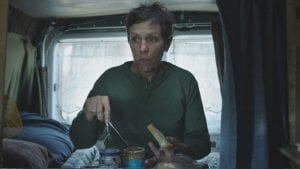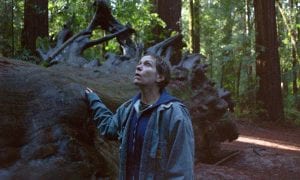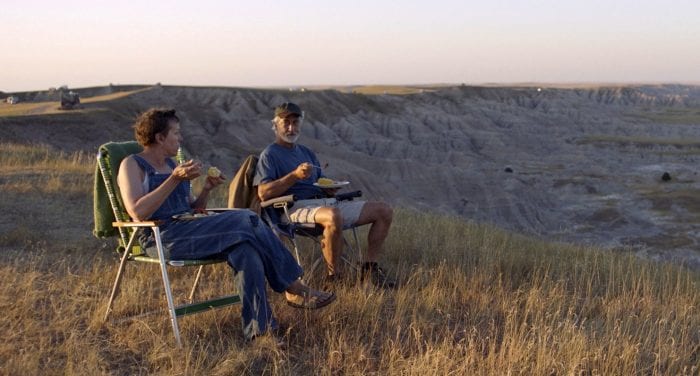Movie Review: Gently shattering – ‘Nomadland’
Reviewed by Jeffrey Sanzel
On January 31, 2011, due to a reduced demand for sheetrock, US Gypsum shut down its plant in Empire, Nevada, after 88 years.
By July, the Empire zip code, 89405, was discontinued.
— Epigraph to Nomadland
It is a cold, bleak landscape that confronts the viewer at the beginning of Nomadland, director Chloé Zhao’s powerful adaptation of journalist Jessica Bruder’s book Nomadland: Surviving America in the Twenty-First Century. The theme of empty expanse returns throughout the careful but compelling hundred-plus minutes. The methodical, introspective film is sparse on dialogue but rich in breadth and breath. The film appropriately takes its time traveling down a specific road.
 Fern (a brilliantly understated Frances McDormand) is a widow who, in 2011, lost her job at the US Gypsum plant in Empire, Nevada, when the factory shut down. The factory’s closing resulted in Empire becoming a ghost town. Fern has sold most of her belongings and lives in a van that she has retrofitted herself. She travels the country looking for work. The film opens with her at the Amazon fulfillment center, working a seasonal job.
Fern (a brilliantly understated Frances McDormand) is a widow who, in 2011, lost her job at the US Gypsum plant in Empire, Nevada, when the factory shut down. The factory’s closing resulted in Empire becoming a ghost town. Fern has sold most of her belongings and lives in a van that she has retrofitted herself. She travels the country looking for work. The film opens with her at the Amazon fulfillment center, working a seasonal job.
Invited by a coworker and friend, Linda May (touchingly playing a version of herself, as many in the film do), she visits a group in the Arizona desert, run by Bob Wells (also a version of himself). Wells hosts gatherings for “van-dwellers,” offering advice, support, and above all, community. Here, Fern connects with others who share similar plights — who, by fortune, luck, or choice — live on the road. Fern gains both insights into her own life along with practical survival skills. The rest of the film follows her learning curve as she goes from place to place but returning to this loose tribe who don’t want “to die with a sailboat in their driveway that they never used.” She wants nothing more than to coexist in communal friendship with the like-hearted.
 There are glimpses into Fern’s earlier life, most notably a trip later in the film to borrow money from her sister, but, for the most part, the film focuses on the ever-present, day-to-day existence. This is a challenging undertaking for a filmmaker, but Zhao’s deliberate pacing and laser focus create both a pastoral arc and one of great tension. Fern drives, makes dinner on a hotplate, sleeps, then drives some more. She takes a job; she works; she leaves. She drives, humming to herself. She walks in nature, taking in its vastness but also completely at peace. And then she drives.
There are glimpses into Fern’s earlier life, most notably a trip later in the film to borrow money from her sister, but, for the most part, the film focuses on the ever-present, day-to-day existence. This is a challenging undertaking for a filmmaker, but Zhao’s deliberate pacing and laser focus create both a pastoral arc and one of great tension. Fern drives, makes dinner on a hotplate, sleeps, then drives some more. She takes a job; she works; she leaves. She drives, humming to herself. She walks in nature, taking in its vastness but also completely at peace. And then she drives.
There are no villains in this film; the conflicts are rooted in the struggles of simple living. The people are kind, hard-working, and open. The impact of the challenges is not small. A blown tire or sub-zero temperatures are truly a matter of survival. But there is a complete absence of self-pity, equaled only in their frankness in discussing any topic — from dealing with waste to the contemplation of suicide.
Throughout, what becomes most pronounced is their cumulative dignity. When questioned by a girl she had once tutored in Empire, Fern responds that she is “not homeless. I’m houseless. There’s a difference.” She says this with a smile and without apology. Her friend Swankie (another in a version of herself), from whom she learns a great deal, shares that she is dying of cancer but choosing to go on her own terms. Swankie gives away many of her possessions and heads back out to visit places she wants to see once more.
 Eventually, Nomadland shows these travelers do not dwell in emptiness, but instead in lives of peace, away from the trappings and limitations of self-imposed restrictions. Fern meets Dave (kind and open as played by David Strathairn) at the gathering and then again later. There are the slightest of romantic sparks. Eventually, Dave settles at his son’s house, where Fern visits him. He asks her to stay, but she realizes that it is not the life she wants. Fern reveals she has found herself in this wandering existence. The revelation is presented in the simplest of ways, but it is epiphanous in its weight and import.
Eventually, Nomadland shows these travelers do not dwell in emptiness, but instead in lives of peace, away from the trappings and limitations of self-imposed restrictions. Fern meets Dave (kind and open as played by David Strathairn) at the gathering and then again later. There are the slightest of romantic sparks. Eventually, Dave settles at his son’s house, where Fern visits him. He asks her to stay, but she realizes that it is not the life she wants. Fern reveals she has found herself in this wandering existence. The revelation is presented in the simplest of ways, but it is epiphanous in its weight and import.
Nomadland’s strength is an absence of pretension. Its documentary feel is intimate and spontaneous; Zhao creates the illusion of the characters speaking for themselves. (She is responsible for the taught screenplay and crisp editing.) And yet, there is a lyrical — almost poetic — quality to the deeper message. These nomads never say, “Goodbye.” Instead, it is always, “I’ll see you down the road.”
McDormand provides a performance of such reality that it is almost impossible to see her as an actor. In the fewest words, she presents stillness, sadness, humor, loss, hope … it is the subtlest rainbow of human emotions. While he has less screen time, Strathairn does not miss a beat. The supporting cast of predominantly “real” people playing some facet of themselves (characters bearing their first names) match these two gifted professionals. There is nothing of reality television or exploitation in this choice. Instead, their presence gives just another subtle shade in the spectrum that Zhao has created.
Composer Ludovico Einaudi has provided an exquisite score. Beautiful and melancholy, the music evokes the spirit and style of George Winston. It is both haunting and life-affirming, perfectly reflecting the film’s tone.
Nomadland has garnered dozens of awards, all of them deserved. The accolades set a high bar of expectation, but it is easily vaulted in the deceptively simple and truly honest storytelling. In some ways, the tale offers a shattering look at the crushing results of failed capitalism. But simultaneously, it celebrates the inspiring resilience of the human spirit. Nomadland is an exceptional journey “down the road.”
Rated R, Nomadland is playing in local theaters and streaming on demand.
Photos courtesy of Searchlight Pictures







